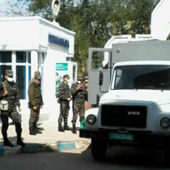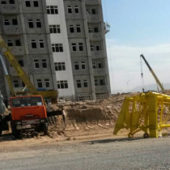(WASHINGTON — June 8, 2015) A veteran RFE/RL journalist in Turkmenistan has resigned from his job, citing an unprecedented campaign of intimidation in a country already regarded as one of the most closed societies on earth.
In his formal letter of resignation, Osmankuly Hallyev, who has worked for RFE/RL’s Turkmen service as a freelance correspondent since 2006, recounted a series of incidents in the last month when he was interrogated by officials with the country’s anti-terrorism team, pressed to reveal his sources, and publicly denounced by local authorities and community leaders. Says Hallyev, «I understand that those people were invited to the meeting to disgrace me and frighten [me] in public.» If he did not renounce his cooperation with RFE/RL, he was told he would be charged with harming the country’s reputation, a crime that can carry a prison sentence.
Said RFE/RL Interim Manager John Giambalvo, “It’s easy to dismiss such experiences in a country as closed as Turkmenistan,” which, with a ranking of 197, placed among the very worst of the 199 countries surveyed in Freedom House’s 2015 Freedom of the Press Index. «But Turkmenistan is seeking international investment and recognition and so must understand that it has obligations, too, including to its own citizens.» Giambalvo added, «Turkmenistan has annual human rights dialogues both with the US and the EU, and these abuses should be raised and made to stop.»
Hallyev has pursued numerous investigative stories while with RFE/RL, including reporting on Turkmenistan’s use of child labor during the country’s cotton harvest. In 2009, Turkmen authorities placed Hallyev under what he termed «house arrest,» and his brother, son, daughter-in-law, and son-in-law were dismissed from their jobs because of Hallyev’s association with RFE/RL; in 2008, prior to an EU-Turkmenistan human rights meeting in Ashgabat, Hallyev was also harassed and his son Umyt was expelled from university. RFE/RL correspondents in Turkmenistan are regularly imprisonedand otherwise harassed by authorities as a result of their collaboration with RFE/RL.
Radio Azatlyk, as RFE/RL’s Turkmen service is known locally, has operated unofficially inside the country since 1953, relying on the work of several freelancers who, repeatedly denied accreditation, work courageously to gather and report on local and regional developments. Over the last two years it has led Turkmen-language media in publishing original video reporting and photojournalism, often in sensitive areas along the country’s 740 km border with Afghanistan.
Despite extensive surveillance and the high expense of the internet, Radio Azatlyk currently attracts an average of 143,000 monthly visits to its web and mobile sites, and has 98,000 Facebook fans.
The service’s increased visibility, coupled with the country’s economic woes and heightened regional tensions, in part related to extremist activity in northern Afghanistan, may account for pressure that has targeted every Azatlyk correspondent over the last two months.






